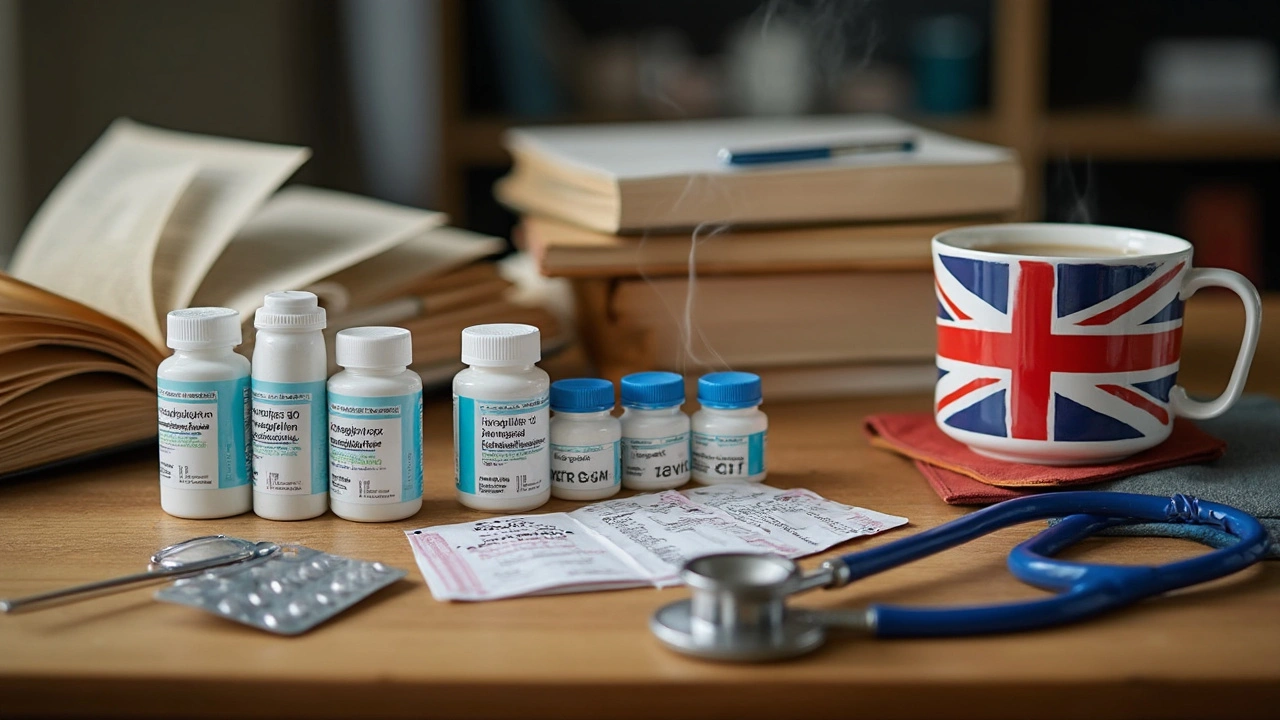SGLT2 Inhibitors vs Metformin: Are Dapagliflozin, Empagliflozin, and Canagliflozin the Best First-Line Diabetes Drugs?

Why SGLT2 Inhibitors Are Grabbing All the Buzz in Diabetes Care
There’s something of a quiet revolution happening in type 2 diabetes treatment. If you’ve been managing diabetes for years, you’ve heard over and over that Metformin is the gold standard—the go-to pill for anyone diagnosed with type 2. Suddenly, that default answer isn’t so, well, default. SGLT2 inhibitors—dapagliflozin (Farxiga), empagliflozin (Jardiance), and canagliflozin (Invokana)—are popping up in doctor conversations way more often. What’s behind this shift, and is it all hype or real hope? Let’s unpack what’s changing.
First, a refresher. SGLT2 stands for sodium-glucose co-transporter-2. These inhibitors are a class of medication that help your kidneys get rid of blood sugar by spilling it into your urine. Yes, your pee. Most traditional diabetes meds, like Metformin and sulfonylureas, either help your body use insulin better or encourage the pancreas to make more insulin. SGLT2 inhibitors bypass the usual insulin route, so they lower blood sugar in a totally different way. This matters, especially for people who have problems with insulin or want another approach.
But the real spark that’s lighting up excitement is about more than blood sugar. Unlike old-school drugs, SGLT2 inhibitors have been linked with reducing hospitalizations for heart failure, weight loss, and even slowing kidney decline. That combo is a blockbuster—diabetes isn’t just about glucose; it’s about protecting the heart and kidneys, too. And with our American lifestyles and risk factors, that’s a big deal.
Not everyone is an ideal candidate, and these drugs aren’t a miracle pill. Still, guideline committees in some countries are now saying SGLT2 inhibitors could be considered as a first choice, especially if other health issues are part of the picture. For anyone newly diagnosed, this is a sea change. Before, Metformin was the only real first suggestion on the menu. Now, your doctor might open with a discussion of your cardiac and kidney health, and offer a menu starring these new drugs.
So if you’re seeing ads or hearing friends chat about the newest diabetes medicines, there’s real science at play, not just big pharma marketing. SGLT2 inhibitors are changing the conversation—and maybe, the entire diabetes playbook.
Meet the Contenders: Dapagliflozin, Empagliflozin, and Canagliflozin Unpacked
So what makes dapagliflozin, empagliflozin, and canagliflozin special—and how do they differ from each other? Nobody wants to switch from one complicated med to another. The beauty of these drugs is that they’re all once-a-day pills, and for many people, they’re just as easy to take as Metformin. The real differences show up in their perks—and quirks.
Empagliflozin (Jardiance) made headlines a few years ago when studies found that people taking it had fewer heart-related deaths and hospitalizations from heart failure. That’s huge, since heart disease is a top killer of people with diabetes. And it wasn’t just a tiny, maybe statistic—the effect was so strong, cardiologists started having opinions about “diabetes” drugs for the first time in years.
Dapagliflozin (Farxiga) shares much of this heart benefit glow. One giant clinical study, the DECLARE-TIMI 58 trial, looked at more than 17,000 people and echoed the results—fewer hospital stays for heart failure and better outcomes for kidney function. This drug recently got FDA approval to be used in people with heart failure, even those who don’t have diabetes. That’s a crossover success most meds never dream of achieving.
Canagliflozin (Invokana), for all its similarities, brings a slightly different twist. It too helps with kidney protection, supported by data from the CREDENCE study. But, in the early days, it scared off some doctors because of a slightly elevated risk for amputations and bone fractures. To be fair, later research suggests the amputation risk is lower than first thought—but that early warning still hangs in some providers’ minds.
All three offer real, documented weight loss—most people drop five to ten pounds without changing their diet much. That’s not a guarantee for everyone, but it’s a bonus you won’t typically see with some older drugs that can actually cause weight gain.
They’re all eligible for combination with other common diabetes meds, too—so you’re not stuck picking just one for life. Each drug goes by a brand name and a generic name, so what you see on your pill bottle might differ from what’s in doctor TikTok clips. Ask your doctor which SGLT2 inhibitor and dose fits your story, especially since there can be difference in insurance coverage and cost. Even with discounts, these newer meds tend to be pricier than old standby Metformin, so check your copay before falling in love.

How Do SGLT2 Inhibitors Stack Up Against Traditional Therapy?
You probably want a straight answer here. Are these new pills really better than the classic go-to like Metformin? It gets complicated—but there are places where SGLT2 inhibitors shine.
Metformin works well, is famously cheap, and has been used safely for over 60 years. Its main effects: lowering blood sugar, possibly helping with weight, and what some call “gentle” side effects in most people—think stomach upset or mild diarrhea at first. It’s rarely enough by itself after a few years, but most guidelines still list Metformin as first-line for most people starting out because it’s dependable, has a low risk for hypoglycemia (dangerously low blood sugar), and fits tight budgets.
Where things flip is if your risk for heart or kidney complications is high. SGLT2 inhibitors beat Metformin and almost every other oral medication in reducing the risk for heart failure hospitalizations and slowing the downhill slide to kidney failure. In fact, a 2021 review in the New England Journal of Medicine found SGLT2 inhibitors reduced heart failure risk by about 33%, and kidney decline by 40% compared to placebo. Those numbers are game changers for patients with any existing heart disease or significant kidney problems—which is a lot of folks with type 2 diabetes.
On blood sugar reduction alone, the SGLT2 inhibitors are not wildly stronger than Metformin. Most people see their “A1c” blood sugar marker drop by 0.7% to 1% with these drugs—about the same ballpark as Metformin or DPP-4 inhibitors, and less than some other stronger classes. But their big pull is the heart and kidney protection. Unlike insulins or sulfonylureas, SGLT2 inhibitors don’t generally cause low blood sugar. That’s a huge relief for people worried about hypoglycemia, especially the elderly or those with wacky work/life schedules.
What about side effects? Both Metformin and SGLT2s are pretty safe. But the SGLT2 group does raise the odds for genital yeast and urinary tract infections, since all that extra sugar is leaving through urine. Most cases are mild and clear up quickly, but it’s good to know. Canagliflozin’s amputation scare seems less than initial warnings, but still worth discussing with your care team if you have poor circulation or nerve issues in your feet.
The weight angle can’t be ignored. Metformin might help keep weight stable, but SGLT2 inhibitors are more likely to actually drop pounds. For someone battling both diabetes and creeping weight gain, that’s a big selling point.
If you’re thinking about making a switch, or just want to expand your horizon past Metformin, check out this handy breakdown of medications similar to Metformin so you don’t miss out on other possible options.
Real World Experiences: What Do Patients and Doctors Say?
It’s one thing to compare numbers in a journal, but the real test of any diabetes drug is how it works for real people living regular lives. When you look at who’s making the switch to SGLT2 inhibitors, a clear pattern pops up: patients with heart disease, kidney changes, or long-standing diabetes aren’t just asking for these meds, they’re getting them on their doctor’s advice.
Doctors admit that cost and insurance headaches can slow down the switch. Even with tasty perks like less insulin dependence, lower weight, and better heart protection, not everyone can afford a shiny new med. People with out-of-pocket costs often have to weigh benefits versus their wallet each month.
Folks taking SGLT2 inhibitors often report feeling less foggy and appreciate not constantly watching for low blood sugar episodes. Those small, daily nudges—better sleep, less bloating, slightly more energy—really add up.
There are occasional bumps in the road. Some patients can’t stand the yeast infections or UTI risk, and might switch back to Metformin or mix with a different class of med. A few report dehydration or unusual fatigue if they’re already not drinking enough water. Yes, peeing away sugar is a good strategy—but you need to stay hydrated so your kidneys don’t get overworked.
One not-so-obvious tip: ask about starter doses and go slow if your doctor is adding an SGLT2 inhibitor to your usual meds. It reduces side effects and helps your body adjust, especially if you have renal issues or are older than 65.
Doctors also flag one rare but scary risk—"euglycemic" diabetic ketoacidosis. It’s a mouthful, but basically means that, in unusual situations (like if you’re sick or not eating), some people can develop dangerous acid levels even if their blood sugar isn't sky-high. It’s rare, but worth knowing. Most providers warn their patients to temporarily stop the SGLT2 pill if they get sick with nausea and vomiting or are fasting for a procedure.
Anyone using these drugs should keep regular tabs with a primary care doc or endocrinologist. Check kidney function, electrolytes, and tell your provider about any foot injuries right away. With those routines nailed down, most people can enjoy the upsides safely.

Making Your Choice: What Should You Ask Your Doctor?
If you’ve made it this far, you’re probably weighing whether all this means Metformin’s reign is ending. Well—it depends on your personal health story. For people with a new diagnosis who don’t have much by way of heart or kidney issues, cost and simplicity still make Metformin a solid pick. But if your labs are showing early signs of kidney trouble, or you have a family history of heart problems, SGLT2 inhibitors push their way forward on the decision tree.
Don’t just accept or reject a new prescription without talking through questions like:
- What are *my* risks for heart, kidney, and vascular problems? If they’re real, SGLT2s might deserve a place.
- What will my insurance cover, and what are my out-of-pocket costs per month? No shame in picking what you can afford long term.
- Am I at risk for frequent urinary issues, yeast infections, or dehydration? If so, have a backup plan.
- How often should my labs (including kidney function and electrolytes) be checked while I’m on these?
- If I get sick or stop eating, what’s my sick day plan for pausing the medicine?
SGLT2s aren’t right for everyone, but they’re more than a passing trend. For a growing list of people—including those with heart failure, mild kidney decline, or chronic weight struggles—they’re stepping into the first-line drug spotlight. If you’re thinking about a change, read up and ask questions. Modern diabetes care is about more than blood sugar—and with all these new choices, there’s no reason to settle for the same old, same old.

11 Comments
Seriously, it's about time we reconsider our steadfast reliance on Metformin.! It's been the go-to for decades, but does that make it unquestionably the best choice?.
These SGLT2 inhibitors like dapagliflozin, empagliflozin, and canagliflozin have been showing tremendous promise!.. Yet, many overlook their potential benefits due to the comfort of tradition.. Why dismiss newer drugs when clinical data is emerging that could shift paradigms?!
What concerns me most is the hesitation rooted in fear rather than evidence; patients deserve options that match their unique conditions and lifestyles.. Pragmatically, adopting these inhibitors might reduce complications that Metformin doesn't address adequately..! Shouldn't healthcare evolve with advancements?!
I have to say, I’m not entirely convinced that SGLT2 inhibitors are this magical solution people make them out to be.. Metformin has stood the test of time for a reason, and frankly, jumping on the bandwagon of newer drugs prematurely might do more harm than good.
We need longer-term studies, especially considering cost and accessibility in many parts of the world where diabetes is rampant.. The side effects of these newer drugs, especially in less controlled settings, raise red flags in my opinion.. It’s not just about being new and shiny.
Let's not throw Metformin under the bus just yet; skepticism is healthy until we see comprehensive evidence.. Always good to question hype before backing it blindly.
Honestly, I read the article but still feel kinda meh about switching.. Like, Metformin's side effects suck, but these SGLT2 drugs seem kinda scary too.
Could anyone share real user experiences? I don't wanna deal with crazy side effects just for the sake of newness.. And yeah, price is always an issue for me.
Maybe the best approach is a mix depending on the person? I dunno.
While I appreciate the enthusiasm for SGLT2 inhibitors, we must approach this topic with measured caution and respect for established protocols.
Metformin has ample evidence supporting its efficacy and safety, backed by decades of use and extensive clinical trials.. To supplant it as the first-line treatment requires incontrovertible proof, which I believe has not yet fully materialized.
Moreover, financial implications and healthcare access disparities must be considered.. We must not advocate for change purely on novelty without thorough consideration of practical ramifications.. Responsible medicine demands nothing less.
Okay, here’s where I gotta jump in and say—if you’re gonna talk about these drugs, you better get your facts straight and spell everything correctly! :)
But seriously, it looks like dapagliflozin and the others have legit benefits, like weight loss and less heart risk, which Metformin doesn’t totally cover.. And if people can tolerate side effects, that sounds like a huge plus to me!
What about those rare infections or ketoacidosis risks, though? Shouldn’t doctors and patients be super clear on those before switching? Legit question.
Oh my, let me tell you, the whole argument about shifting from Metformin to SGLT2 inhibitors reeks of the arrogance seen in transient medical fads..! The over-celebration of these newer drugs without acknowledging their insidious side effects and economic burdens is just plainly reckless..
The very idea that these medications are inherently superior because they’re 'modern' strikes me as naive.. One must consider the holistic impact on patients, especially those from marginalized communities who may face barriers to access and adherence!
This is not merely a choice; it is a moral obligation to scrutinize and not capitulate to the latest pharma glorification prematurely.. Prudence and patient well-being must always come first. Period!!
Hey, I’ve read a bit about SGLT2 inhibitors in clinical settings, and from what I gather, they do offer some advantages for certain patients, particularly those with cardiovascular issues.
That said, they're not universally suitable and warrant careful patient selection.. Also, the cost and monitoring requirements can limit their use.. So while they’re promising, Metformin remains a solid baseline choice for many.
For anyone curious, consulting your healthcare provider is key — personalized medicine is the future, after all.
ugh.. all this fancy talk doesn’t really change how these drugs can mess you up sometimes.. i mean, side effects that they barely mention.. what if you’re stuck with nasty infections or worse?
metformin is old, sure, but it’s simple. no complicated rules or crazy risks.. idk why everyone wants to make things confusing..
plus these new drugs probably cost a ton. i’m not buying into the hype anytime soon.
Let me be unequivocal: the superiority claims regarding SGLT2 inhibitors over Metformin as first-line therapy are, at best, premature and founded on incomplete data.
Metformin’s extensive longitudinal efficacy, safety profile, and cost-effectiveness set a benchmark that emerging therapies have yet to conclusively surpass.
Pharmacological decisions must not be guided by novelty but by rigorous evidence-based medicine.. Thus, clinical prudence dictates maintaining Metformin's primacy unless substantiated otherwise.
From a cultural standpoint, we must recognize how new drugs like SGLT2 inhibitors influence patient trust and adherence, especially in diverse communities. While these medications are promising, healthcare providers must ensure inclusive education and support when recommending alternatives to Metformin.
The reality is, changing first-line treatments involves more than just clinical outcomes; it touches on social and economic fabrics that shape health behaviors worldwide..
So, before heralding a paradigm shift, let's also invest in understanding patient perspectives across cultures.
oh wow, I never thought about how these newer meds like dapagliflozin might actually help with heart stuff too! that seems pretty important, right? :D
but reading all this makes me wonder, like, how do patients decide what's best for them—it's not just about science but also feelings and personal stories I guess :)
i think doctors gotta do more than just throw papers at patients—they need to explain, listen, and maybe even shine some light on the hopes and fears people carry. it’s more than pills, it’s life! 💖